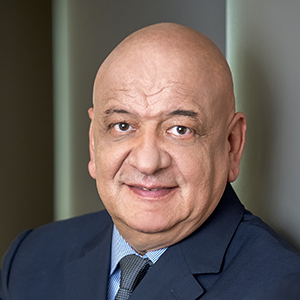Students and teachers at Corvinus can already see the results of model change
2021-05-19 12:21:46The foundation model allows more flexible operation and a more relaxed regulatory environment associated with a private university status, as well as the possibility of long-term predictable planning
The foundation model allows more flexible operation and a more relaxed regulatory environment associated with a private university status, as well as the possibility of long-term predictable planning’, said Anthony Radev, President of Corvinus University of Budapest to hirado.hu, also revealing how much more the students receiving degrees at Corvinus University can earn during their careers compared to other economics graduates. It turns out that the lecturers and staff at the university have also received a substantial pay rise.

As the first university to change its model, Corvinus has already gained some practical experience about the new structure. What are the main benefits of foundation-based operation?
The most important benefit is that the foundation model allows more flexible operation and a more relaxed regulatory environment associated with a private university status, as well as the possibility of long-term predictable planning. This structure also facilitates a more pronounced market approach to be brought to the university. After almost two years the initial results of the transformation are already visible, including faster and more efficient decision-making mechanisms, projects implemented at a higher speed, and the academic and non-academic staff wages gradually approaching the market rates.
Being the first is always the hardest. What kind of advice would you give to the universities embarking on this change?
The situation of every university is unique, so there is no universal model to fit each and every one of them. I can only tell how we did it at Corvinus University. As the very first step, we set the initial goals. After reaching a consensus about them at an institutional level, we selected the management team capable to not only relate to the established goals but also to accomplish them. As a third step, a uniform strategic plan, or institutional development plan was required. These three steps were instrumental at Corvinus University in laying a stable foundation and planning ahead for a longer term.
In a decade Corvinus could be a top university in the region. Do you find this goal achievable?
Absolutely. The foundation has already been laid, and all the teachers and staff at Corvinus are working towards this strategic goal. Our aim is to make Corvinus a top-ranking international university of economic and social sciences in the Central and Eastern European region by 2030. To this end, we will need regionally outstanding educational programmes, internationally recognised research results, a globally competitive academic and research community, world-class student experience, and innovative partnerships with corporate and institutional partners. For each of the areas a separate project team has been set up to work according to pre-designed schedules and deadlines to accomplish these strategic goals.
Who are the biggest competitors in this field?
Corvinus is the top Hungarian university in the field of economic and social sciences. However, our aim for the next few years is to reach an outstanding rank in Central and Eastern Europe, and therefore our main competitors include some of the regional universities of economics and economic sciences for example in Vienna, Zagreb, Warsaw and Prague. The universities of England, the Netherlands, Austria and Germany attract many talented Hungarian students. These countries are also our competitors, but we seek to build partnerships with these foreign universities in order to be able to provide the same level of services that they can.
Let’s talk about the Corvinus brand. How important do you think it was for the institution to change its name from University of Economic Sciences and Public Administration of Budapest, difficult to pronounce for foreigners to a name easily ‘marketable’ even outside of Hungary?
As I said, the focus is on an international dimension; our aim is to make Corvinus into an internationally recognised successful university over a short period of time. It is a logical element of our international strategy to find a brand name that is easy to recognise, remember and identify for foreign students.

How many foreign students do you have? Are you planning to increase the proportion of foreign students, and if yes, how?
Currently we have more than 2,000 international students. Last year one-third of the students admitted to our masters programmes were foreigners even despite the pandemic. We are gradually increasing the number of foreign students at Corvinus University, and are aiming to attract more students from the Central and Eastern European region in the coming years. To this end, an organisational unit was set up last year to recruit international students with the primary goal of increasing their numbers. At the same time, our portfolio accessible in English language, including on a partial or exclusive basis, is being extended continuously.
Is Budapest as a location an advantage or a disadvantage?
Based on its Central European location and the proximity of some large European cities Budapest is an increasingly attractive and popular tourist destination and ideal for foreign students. We also hope that the benefits and opportunities offered by the capital city will help us attract an increasing number of colleagues engaged in education and research at renowned foreign universities.
The level of education is a key to continued improvement, and it requires adequate wages. Corvinus has taken an important step in that direction by introducing the academic career model. How was the new structure received by the teachers of the university?
In the almost two years since the model change the teachers and staff of Corvinus University received on average 38% increase in total wages. Remuneration is a key; we can only expect our colleagues to perform at their best if there is no need for them to undertake second or third jobs and divide their efforts in order to make a decent living. In parallel with the wage increase, the academic career model was introduced in February 2021 for the first time in Hungary, following a period of lengthy preparations, discussions and constructive debates, specifically to enable academic colleagues to focus on their primary field of education or research.
What is the most important task for Corvinus University for the next few years?
Since last autumn we have launched four programmes with renewed form and content, and we are planning to introduce another eight from September. We will continue to reform our entire educational portfolio over the coming years, and we are planning to launch some programmes that are completely new in Hungary with the potential to provide a competitive advantage both at Hungarian and Central European level. As a part of our international strategy, we are continuously increasing the number of English language courses as well as the number of foreign students, while hoping to attract more and more foreign lecturers as well. The academic career model introduced this year is expected to bring about more internationally recognised research results than ever, supported in every possible way by our new research incentive scheme. Another important goal for the coming years is to increase the number of innovative partnerships with both corporate and institutional partners.
What are the potential benefits of the new structure for the students of Corvinus University, and what can they expect in the future?
In the next few years we seek to ensure for our Hungarian and foreign students the kind of experience that is offered by the Western European and American universities. We have already laid the foundation by introducing a modern open student office suitable for coworking and our own university application, and digitizing the entire student administration process. In exchange we expect our students to focus on their studies and to do their best during their years at the university. That is why a performance-based Corvinus Scholarship scheme was introduced supported by our foundation to help our best-performing students to complete their university studies free of charge, while increasing the amount of the available study grants as well. We are willing to provide every help and financial support for our talented hard-working students; in exchange we want them to focus their time and energy on the years spent at Corvinus University to ensure the highest possible level of academic achievement. Based on the latest data of the Graduate Career Tracking System-Integration of Administrative Databases (GCTS IAD) the time and energy invested in attaining a Corvinus degree is well rewarded in the labour market in financial terms. Naturally, our talented disadvantaged students are also given assistance and support.
Is the success of a university on a par with the successes achieved by its graduates in their subsequent careers? To what extent does Corvinus University monitor the professional advancements of alumni?
The majority of the current Hungarian political and economic elite received their degrees at Corvinus University. Naturally, we monitor the progress or our ex-students and rely on them in training the future professionals and supporting their initial careers in accordance with our traditions. The reformation of the Corvinus alumni scheme is currently under way. Similar to the active students, the aim is to provide more and more experience-based services to our former students as well, with a view to keeping up and tightening relations.
What kind of feedback do you receive from the companies employing Corvinus graduates?
Personally, I receive a lot of positive feedback, but I prefer to rely on the actual figures in order to get a more comprehensive picture. According to our calculations Corvinus graduates earn 110 million forints more during an entire career than any other economics ex-students at a national level.
What are the skills to be developed in order to ensure the competitiveness of freshly graduated Corvinus students not only in Hungary but globally as well?
The most important skills include the Four Cs: communication, collaboration, creativity and critical thinking. By renewing our programmes the primary goal is to ensure that our graduates possess these essential skills. In my opinion the combination of these four skills acquired during the university years are the key to future success on both the domestic and the global labour markets.
Source: hirado.hu